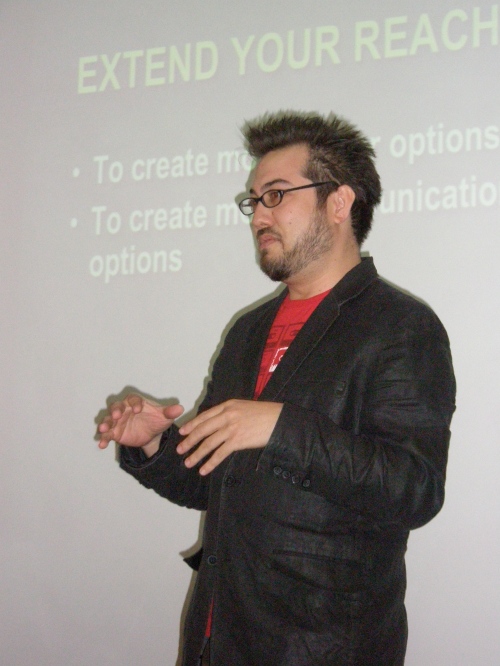by Amy McLeod
Communications professor Ken Calhoun spoke to Elon students on April 8 about interactive media and how it is growing and being used to inform audiences.

Ken Calhoun talk to Elon students about interactive media in today's industry.
“Traditional media is a one directional media,” Calhoun said. “There’s a sender and there’s a receiver. Interactivity allows for this kind of conversation, active participation by the audience. It provides back-and-forth in the model, more of a conversation. That’s what people want from their media.”
The three “flavors” of interactive media that Calhoun says are beginning to develop are storytelling, responsive visuals and conversation.
STORYTELLING
Interactive media is becoming a popular way to tell stories. Media objects such as interactive narratives give the viewer the ability to make decisions that impact the plot of the story.
“It gives viewers the opportunity to have a media experience that you can navigate yourself,” Calhoun said.
There are no longer restrictions for the type of media used to tell a story – video, pictures, audio, etc. It all depends on which type of media will most effectively tell each portion of the story.
Listen to Ken Calhoun talk about strategies for effective interactive storytelling.
RESPONSIVE VISUALS
“Responsive visuals are experiences we have online that are really visually based,” Calhoun said. “They’re graphics, info graphics, data visualizations, timelines, maps, stuff like that.”
In order for responsive visuals to be effective, they must be self-revealing and truly interactive.
“They have to be open, organic and fed by the changing world,” Calhoun said.
CONVERSATION
“Conversations are the social media aspect,” said Calhoun. “All those aspects where we’re contributing to a narrative; we’re contributing to a body of text.”
As Facebook, Twitter, Flickr and blogs explode, conversation media are becoming a popular and very effective way to communicate. Calhoun says that these social networks have become interactive media because they are setting the conditions for conversations, not hosting them.
